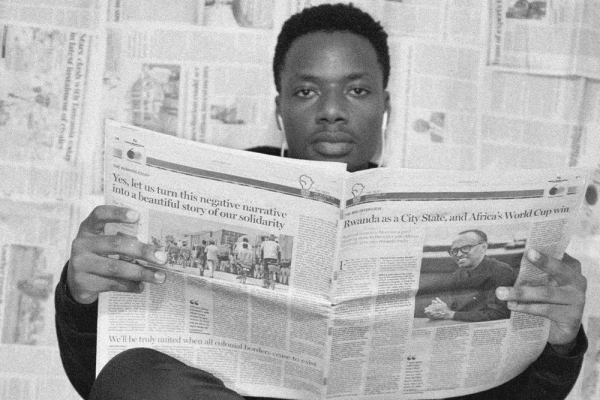In 2019, Facebook started feeding me advertisements for a burgeoning online Christian media publication called The Pour Over.
Sold as concise world news for Christians, The Pour Over’s unintentionally perfect blend of cringe millennial aesthetics and Christian in-jokes had me obsessed. One entry encourages readers to “listen to ya boi Paul” when it comes to addressing anxiety over unrest in the Middle East, while citing 1 Timothy 2:1-3 in the illegible calligraphy script of the 2010s. Another read as follows: “The presidential cabinet seems to have more turnover than your church’s youth worship pastor position,” and was printed against a preppy salmon-hued backdrop. Now well into the internet’s post-sardonic era, the sincerity of The Pour Over’s aesthetically and allegorically dated references tickled my brain in a way few things can.
Since then, The Pour Over has dropped the pastels and curly-q font and now produces a thrice-weekly newsletter that boasts over 375,000 newsletter subscribers and an active Instagram account that outpaces most major Christian news sites (Sojourners included).
When I spoke over video call with CEO and editor-in-chief Jason Woodruff in June, he told me that The Pour Over was founded out of “a lack of better options.”
“Traditional news sources promote obsession, they promote anger, they promote division,” the 28-year-old Iowa resident told Sojourners. “That’s why people either become shaped by those [divisions], or they flee and they become uninformed.”
Branded as a “politically neutral” and “trustworthy news source,” The Pour Over is Woodruff’s answer for Christians looking for facts without the spin. It’s a publication that doesn’t take sides and offers a brief biblical encouragement at the end of each story. It highlights the day’s biggest news, approximately takes five minutes to read, and is purportedly punchy.
Because The Pour Over looks to cover “the biggest, most visible, news stories,” Woodruff notes that it will often include stories that he and the staff deem “not worth caring about,” acknowledging that “a reality of being a Christian in America today is that you’re going to hear about these things in the news.”
“If we have an opportunity to explain more of the facts and push and introduce some compassion or eternal perspective, that would be good.”
Previously a program manager at Dish Network, Woodruff started The Pour Over as a personal exercise of “summarizing the news” for himself before eventually pursuing it as his full-time job. When asked about why he felt qualified to start a media outlet despite having no prior professional experience, Woodruff demurred, “It was growing.”
In spite of the publication’s sophomoric quality, the lack of expertise is a selling point with the company touting how it was “started by people with no journalism or theological training.” The editorial team is comprised of writers across the political spectrum (including one staffer that Woodruff described as “politically disinterested”) and includes a dentist, nurse practitioner, lawyer, and stay-at-home mom — all of them moonlighting as part-time journalists.
The publication’s growth is indicative of the rise in nontraditional news sources, ranging from podcasts and newsletters to YouTubers and influencers, spurred on by a growing distrust in institutions including the mainstream press. “Trust and confidence” that mass media is “reporting the news fully, accurately and fairly” is near a record low, according to a 2022 Gallup poll. Traditional news outlets looking to shore up trust from a disinterested and skeptical public have pursued similar tactics to those of The Pour Over. Many publishers are banking on brevity, shifting their language, and separating facts from analysis in the hopes of keeping readers tuned in and their profits above water.
But considering the staff’s inexperience, it wasn’t apparent to me what made the publication “trustworthy.” According to Woodruff, it’s The Pour Over’s “lack of political motivation.”
“We believe in objective truth. We believe that there are often right and wrong,” Woodruff told me when asked about its editorial process. “There are many times when our entire staff agrees on a specific issue, but that doesn’t mean that we’re going to only present that side. We trust our readers to be able to be discerning.”
That purported neutrality is built on the hope that Christians avoid “falling into culture wars that promote hate of the other group” and instead seek greater understanding and love for “political enemies.” Concerned by how Christians, and Americans in general, are becoming siloed in ideological media echo chambers, Woodruff wants Pour Over readers to understand what “both sides” are saying about the news of the day.
But Woodruff’s philosophy conflates the understanding of other political opinions with the belief that they should hold equal weight, a fatal conclusion that misleads and misinforms his readership. While I resonate deeply with the idea that all Americans need an accurate view of what their political others believe, these perspectives shouldn’t be framed in an amoral vacuum. Political neutrality has never been the silver bullet that some presume it to be.
The limitations of this political indifference were evident when I asked Woodruff whether he thought President Joe Biden was the legitimate winner of the 2020 election, a fact that is demonstrably true but politically inconvenient if you’re hoping to appease both Democrats and Republicans.
“It’s not our goal to convince people that Biden was legitimately elected,” said Woodruff. “I think that’s something that our team would generally agree on, but honestly, it doesn’t matter to us. It doesn’t matter to The Pour Over whether or not he was legitimately elected because we’re going to write about what he’s doing as president.”
It’s unclear how Woodruff can maintain that The Pour Over is both “objective” and “trustworthy” when the publication appears unwilling to commit to a simple, though not politically insignificant, fact. Over 60 percent of Republicans believed Biden won due to “voter fraud.” Sixty percent of Americans had an election denier running for a political office in their state in 2022. Former President Donald Trump’s lies about voter fraud spurred the attempted Jan. 6 insurrection.
Woodruff deflected the question of whether there was evidence of voter fraud during the election saying, “Even if the election was stolen, our job remains the same and that’s to love God and love others and share the gospel and care for the poor.”
This is not to say that journalists should function as partisan activists, but the truth rarely sits at the political center. (And it goes without saying that holding the center is also an inherently political position.) Political actors should always be viewed with healthy skepticism, but the Republican Party is unique in its recent turn toward “alternative facts” and publicly consistent commitment to encouraging clear falsehoods. And by seeking to discredit the institutions that can hold them accountable, Trump and those who follow his playbook have targeted journalists with a strategy that former White House chief strategist Steve Bannon summed up succinctly: “Flood the zone with shit.”
Presenting all perspectives as equal creates a false binary and results in an unwillingness to hold firm, journalistic principles for the preservation of democracy and human rights, all while eroding public trust. According to reporter Sean Illing, “The issue for many people isn’t exactly a denial of truth as such. It’s more a growing weariness over the process of finding the truth at all. And that weariness leads more and more people to abandon the idea that the truth is knowable.”
In fairness, this lack of perspective is not characteristic of all of The Pour Over’s work. Reporting on natural disasters and lost lives are accompanied by calls for prayer and action. Coverage of mass shootings has included calls to provide monetary support for victims’ families and the company donated $1,000 to the families of the 2023 Nashville school shooting.
But because the rights and perspectives of minority groups are often the most politicized, the tendency of the media to project impartiality has historically come at marginalized people’s expense. A commitment to “neutrality” in the face of a moral crisis, even concealing important information, has led American newsrooms to legitimize atrocities including violence against racial minorities and LGBTQ+ Americans.
In one such example of false balance, a Pour Over piece on the subway killing of Jordan Neely, a Black man, framed concerns over “race relations” against arguments that his killer, a white man, was a “good Samaritan.” The two perspectives are given equal space on the page, leaving the moral weight and apparent scope of both points of view obscured. Yet the story notes that Neely, who witnesses claim was acting erratically, was placed “in a chokehold” by Daniel Penny, but describes Neely’s death in the passive voice, saying he “lost consciousness and was not able to be resuscitated,” thereby removing direct responsibility from Penny.
“Instead of telling hard truths in this polarized environment, America’s newsrooms too often deprive their readers of plainly stated facts that could expose reporters to accusations of partiality or imbalance,” journalist Wesley Lowery wrote for The New York Times in 2020.
Commitments to perceived balance are becoming increasingly challenged by nonwhite journalists. Per an April Pew Research study, 76 percent of journalists are white, and The Pour Over is no different with a “majority white” editorial staff, though Woodruff said that “racial diversity is something that we are actively working to expand.”
In these ways, The Pour Over is not so different from the mainstream outlets it’s seeking to distinguish itself from. In chasing the biggest news of the day, The Pour Over magnifies the vices of the mainstream press by framing its own view of objectivity as in line with the divine. The daily news is not all-encompassing, and holding a long-term perspective is important, but it also has real material and spiritual consequences. Good journalism should inform readers not only of the facts but also of the stakes.
By framing the news as all-but-equal, The Pour Over pushes readers toward an unbiblical political indifference.
Got something to say about what you're reading? We value your feedback!







